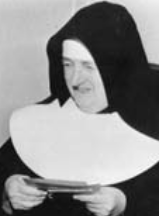Hilda Marley
Hilda Gertrude Marley OBE (13 October 1876 – 19 November 1951), known in her religious order as Sister Marie Hilda, was a British educator, psychologist and Roman Catholic religious sister.
Early life and education
Hilda Marley was born in Bishop Auckland in 1876, the daughter of George Marley and Marie Anne Caroline Simonds. Her father was a miller.[1] She moved with her family to Wynberg in 1879, and attended convent schools in South Africa and England.[2] She trained as a teacher at the Notre Dame Training College for Teachers in Liverpool. In 1910 she earned a bachelor's degree in history from the University of London.[3] She pursued further studies in psychology at Louvain University.[4]
Career
In 1901, Marley became a sister in the Roman Catholic teaching order of Notre Dame de Namur. Bailey (or Sister Marie Hilda, as she was known) taught psychology at the Notre Dame Training College in Dowanhill, Glasgow, from 1904 to 1941. In 1931, she co-founded and directed the Notre Dame Child Guidance Clinic with a colleague, Robert Robertson Rusk.[5] It was the first child guidance clinic in Scotland.[6] She published a textbook,[1] and spoke internationally on child guidance.[4] She was frequently called upon to defend her work in the context of her religious vocation, especially when she engaged with modern and secular psychological ideas.[7][8]
Marley became a fellow of the British Psychological Society in 1942. She was vice president of the Guild of Catholic Social Workers in 1943. In 1944, she was vice president of the Scottish branch of the British Psychological Society, and was appointed to the Scottish Advisory Council on the Treatment and Rehabilitation of Juvenile Offenders. In 1947 the Archbishop of Glasgow presented Marley with the Cross Pro Ecclesia et Pontifice, and she became a fellow of the Educational Institute of Scotland. In 1951 she was vice president of the Catholic International Congress of Psychiatrists and Psychotherapists. She served on the executive board of the Scottish Association for Mental Hygiene.[4]
Personal life
Marley was deaf, and under 5 feet in height.[4] She was named to the Order of the British Empire just before she died in 1951, aged 75 years, in Glasgow.[1] Her clinic in Glasgow is now part of the Notre Dame Centre.[9][10]
References
- ^ a b c Ewan, Elizabeth L.; Innes, Sue; Reynolds, Sian; Pipes, Rose (2007-06-27). Biographical Dictionary of Scottish Women. Edinburgh University Press. pp. 253–254. ISBN 978-0-7486-2660-1.
- ^ Henryk Misiak (1954). Catholics In Psychology: A Historical Survey. McGraw-Hill. pp. 208–210.
- ^ University of London (1912). The Historical Record (1836-1912) Being a Supplement to the Calendar Completed to September 1912. Hodder & Stoughton. p. 398.
- ^ a b c d Richmond, Lesley M. "Marley, Hilda Gertrude [name in religion Marie Hilda] (1876–1951), psychologist and educationist". Oxford Dictionary of National Biography. doi:10.1093/ref:odnb/52745. Retrieved 2020-07-09.
- ^ Stewart, John (May 2006). "An 'enigma to their parents': the founding and aims of the Notre Dame Child Guidance Clinic, Glasgow". The Innes Review. 57 (1): 54–76. doi:10.3366/inr.2006.57.1.54. ISSN 0020-157X.
- ^ Rodger, Thomas Ferguson. Typescript notes for a memorial lecture for Sister Marie Hilda titled 'The parent in the permissive society' (October 1968), in the Papers of Thomas Ferguson Rodger, University of Glasgow Archive Services.
- ^ Stewart, John (2015-10-06). Child Guidance in Britain, 1918–1955: The Dangerous Age of Childhood. Routledge. pp. 73–78. ISBN 978-1-317-31912-2.
- ^ STEWART, JOHN W. (2006). "Child Guidance in Interwar Scotland: International Influences and Domestic Concerns". Bulletin of the History of Medicine. 80 (3): 513–539. doi:10.1353/bhm.2006.0117. ISSN 0007-5140. JSTOR 44448432. PMID 17147134. S2CID 21175539.
- ^ "The art of child's play". HeraldScotland. 4 October 1999. Retrieved 2020-07-09.
- ^ Millar, Barbara (9 October 2019). "The Notre Dame Centre: Supporting Children in Scotland for 90 Years". Scottish Review. Retrieved 2020-07-09.
External links
- Mary Ross, Jo McCallum, eds., Freedom to Grow: Celebrating 75 Years of the Notre Dame Centre in Scotland (Publishing Cupboard 2007). ISBN 978-0955329456

